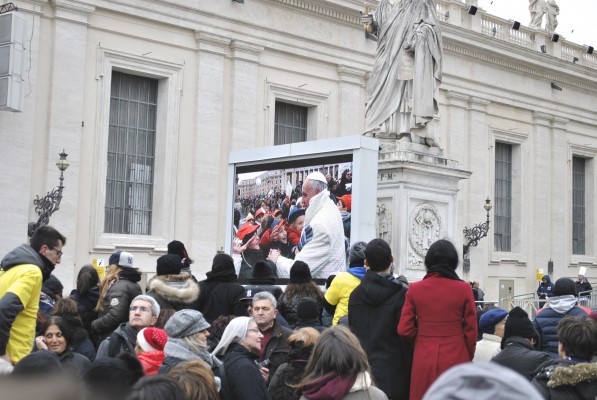Pope Proves to be Progressive with the Synod
Controversy is circulating about the Pope’s seemingly progressive Synod. (Tessa Van Bergen/The Observer)
October 22, 2014
This October, the world has witnessed shifts in the Catholic Church as the controversial topic of gay marriage and homosexual exclusion was brought to scrutiny by Pope Francis through the Extraordinary Synod.
The lack of marital equality for homosexual relationships has been in the forefront of the American media for years. Now, for the first time, the Church is opening up a discussion about the morality of the exclusion of the LGBTQ community.
Pope Francis convened an assembly of handpicked Roman Catholic bishops, called a synod, to discuss this controversial issue. The 12-page document that was released after the meeting, called the Relatio post disceptationem revealed Pope Francis’s push for a change in the Catholic attitude towards homosexuals.
Although this document does not assert a change in the doctrine that marriage is between a man and a woman, it does insist that to exclude members of the LGBTQ community is to turn away valuable believers.
The document proposes that gay people have “gifts and qualities to offer to the Christian community” and that while the Church does not condone the union or marriage of gay couples, it is essential that, in the words of Archbishop Bruno Forte, in a news conference “we respect the dignity of every person.”
Some of Fordham’s own religious authorities agree that it’s important for the Church to be inclusive. Father Vincent Decola S.J., assistant dean and program advisor for the Gabelli School of Business at Lincoln Center (GSBLC) said, “I think this is a step in a good direction for the Church to at least be listening, be willing to learn and grow and not feel like everything that has been taught in the past is necessarily written in stone for all times.”
This dramatic change in regard for non-heterosexual people represents a serious step towards a more accepting and inclusive version of the Christian faith.
Unsurprisingly, however, there is a lot of disagreement within the Church about the Relatio as more conservative bishops insist that this change is compromising the Church values and beliefs.
Complaints of deviating from Catholic teaching are coupled with complaints of Pope Francis’s bias in choosing bishops for the assembly and the polarized media coverage of the resulting document. American Cardinal Raymond Burke is one of the most outspoken church officials disturbed by the Relatio and its publicity, and said in a full-page interview published in Italian by the conservative daily Il Foglio, “It seems to me that information is being manipulated in a way that gives comment to only one theory instead of faithfully reporting the various positions expressed.” Father James Martin addressed the media briefly in Fordham’s discussion on Monday, Oct. 20, in Pope Auditorium “Who Am I To Judge?” saying, “I don’t think that the media made too much of this. This was in fact a change. There are a lot of people who are saying, ‘This is baloney.’ No, this is a big change.” He added, regarding the enormous disagreement between the Pope and some religious figures, “I [have] never seen … Cardinals, and certainly Archbishops critique the Pope so much.”
In response to concerns and hopes for the changing view of homosexual relationships, church officials continue to remind the public that the Relatio is a work in progress, not a decree or doctrine. The document states, “These are not decisions that have been made nor simply points of view. The reflections put forward, the fruit of the Synodal dialogue that took place in great freedom and a spirit of reciprocal listening, are intended to raise questions and indicate perspectives that will have to be matured and made clearer by the reflection of the local churches.”
Will these new discussions about the support and acceptance of homosexual persons bring about a real change in the near future? At this point, it is unclear. With Church officials at odds about ideas of embrace and ideas of traditionalism, it’s hard to say whether or not this new document will open the path for a new doctrine in the future preaching equal rights for the LGBTQ community. As for the Catholic leaders of our Fordham community, there seems to be a general consensus in favor of Pope Francis’s push for LGBTQ inclusion. “We as a community, we grow and we learn and we develop, and we need to change, perhaps, our views on human reality,” Decola said. He expresses his wish for acceptance, adding, “Rather than say what I think will happen [in regards to gay marriage], let me just say that I hope it will happen.”
For now, as Cardinal Luis Antonio G. Tagle puts it, “So the drama continues.”










